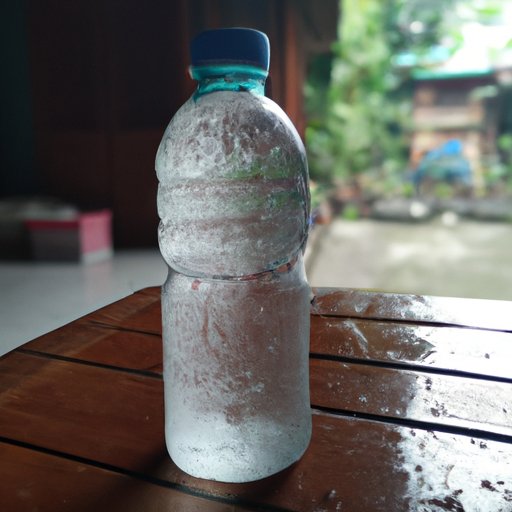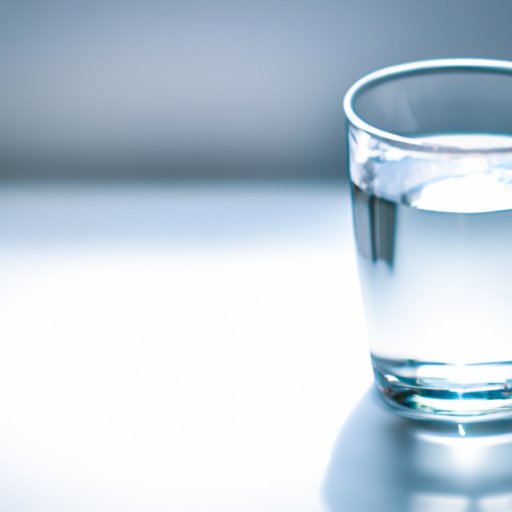Introduction
Thirst is an important signal from our bodies that indicates we need to replenish fluids. Dehydration occurs when we don’t drink enough water or other fluids to replace what we lose through normal bodily functions. In order to remain healthy and properly hydrated, it’s essential to understand how not to be thirsty.

Drink Plenty of Water Throughout the Day
Drinking plenty of water throughout the day is one of the best ways to avoid being thirsty. Water helps to regulate body temperature, lubricate joints, and flush out toxins. It also keeps us feeling full and energized, which can help us make healthier dietary choices.
Benefits of Drinking Water
In addition to helping us stay hydrated and energized, drinking enough water can improve our overall health in many ways. It can boost our immune system, improve digestion, reduce headaches, and help keep our skin looking healthy and youthful. Plus, it’s calorie-free and doesn’t contain any added sugars or artificial ingredients.
Tips for Increasing Water Intake
If you’re having trouble getting enough water each day, there are a few simple tips that can help. Start by setting a goal to drink a certain amount of water each day and track your progress. You can also try adding flavor to your water with lemon, lime, or cucumber slices, or buy a reusable water bottle with measurements on the side so you know exactly how much you’re drinking.

Avoid Sugary Drinks and Alcohol
Sugary drinks and alcohol can contribute to dehydration, so it’s best to limit these beverages as much as possible. Sugary drinks like soda, energy drinks, and sweet tea are often packed with calories and can cause blood sugar levels to spike. Alcohol, on the other hand, is a diuretic, meaning it causes the body to expel more fluid than it takes in.
Reasons to Avoid Sugary Drinks and Alcohol
In addition to contributing to dehydration, sugary drinks and alcohol can have a number of negative health effects. Sugary drinks can lead to weight gain, while alcohol can impair judgment and increase the risk of injuries and accidents. Both can also increase your risk of developing diabetes, heart disease, and other chronic health conditions.
Alternatives to Sugary Drinks and Alcohol
If you’re looking for alternatives to sugary drinks and alcohol, there are plenty of options. Try drinking sparkling water, unsweetened iced tea, or homemade smoothies and juices. Herbal teas and coffee can also be good options, though it’s important to monitor your caffeine intake (more on this later).

Eat Foods with High Water Content
Eating foods with high water content is another great way to stay hydrated. Many fruits and vegetables are naturally high in water, including cucumbers, melons, lettuce, tomatoes, grapefruit, and strawberries. These foods provide essential vitamins and minerals, plus they’re low in calories and fat.
Examples of Foods with High Water Content
In addition to fruits and vegetables, there are other foods that are high in water content. These include yogurt, soup, oatmeal, cottage cheese, and even some meats like chicken, pork, and beef. Eating a variety of these foods throughout the day will help ensure you get enough fluids.
Benefits of Eating Foods with High Water Content
In addition to keeping you hydrated, eating foods with high water content can have other health benefits. They can help keep you feeling full longer, provide essential nutrients, and even aid in weight loss. Plus, they’re a delicious way to get the fluids your body needs.
Keep a Reusable Water Bottle with You
Carrying a reusable water bottle with you throughout the day is a great way to stay hydrated. It makes it easier to track how much water you’re drinking and ensures you always have access to a cold glass of water whenever you need it.
Reasons to Carry a Reusable Water Bottle
Not only does carrying a reusable water bottle make it easier to stay hydrated, but it also helps reduce plastic waste. Using a reusable water bottle means fewer single-use plastic bottles ending up in landfills and oceans. Plus, it’s more cost-effective in the long run, since you won’t have to keep buying single-use bottles.
Options for Reusable Water Bottles
When shopping for a reusable water bottle, there are lots of options to choose from. Stainless steel bottles are durable and insulated, while glass bottles are lightweight and free of harmful chemicals. Plastic bottles are also an option, though it’s important to find one made from BPA-free materials. No matter which type you choose, make sure it’s dishwasher safe for easy cleaning.
Monitor Your Caffeine Intake
Though caffeine can give us a temporary energy boost, it’s important to monitor our intake. Too much caffeine can lead to dehydration, as it increases the amount of water our bodies expel as urine. To avoid this, try to limit your caffeine intake to no more than 400 mg per day.
Reasons to Monitor Caffeine Intake
In addition to contributing to dehydration, too much caffeine can lead to other health issues. It can cause restlessness, anxiety, insomnia, headaches, and even nausea. Plus, it can interfere with the absorption of vital vitamins and minerals, leading to nutritional deficiencies over time.
Ways to Reduce Caffeine Intake
If you want to reduce your caffeine intake, there are a few simple steps you can take. Start by limiting your intake to one cup of coffee or tea per day and switch to decaf when possible. You can also try swapping out caffeinated beverages for herbal teas or sparkling water, or opt for a smaller size when ordering coffee or tea.
Conclusion
Staying hydrated is essential for optimal health and wellbeing. The best way to avoid being thirsty is to drink plenty of water throughout the day, avoid sugary drinks and alcohol, eat foods with high water content, carry a reusable water bottle, and monitor your caffeine intake. By following these tips, you can stay hydrated and maintain your overall health.
Summary of Key Points
To not be thirsty, it’s important to drink plenty of water throughout the day, avoid sugary drinks and alcohol, eat foods with high water content, carry a reusable water bottle, and monitor your caffeine intake. All of these strategies can help keep you hydrated and promote overall health.
Final Reminders for Staying Hydrated
Remember to set a goal for how much water you want to drink each day and track your progress. Choose reusable water bottles instead of single-use plastic bottles, and try adding flavor to your water with fruit slices. Lastly, limit your caffeine intake to no more than 400 mg per day.
(Note: Is this article not meeting your expectations? Do you have knowledge or insights to share? Unlock new opportunities and expand your reach by joining our authors team. Click Registration to join us and share your expertise with our readers.)
